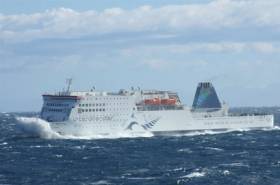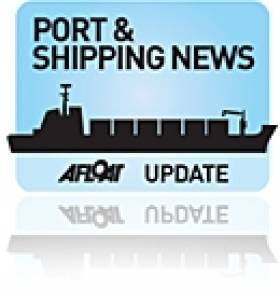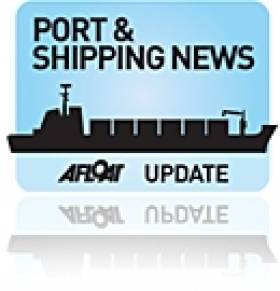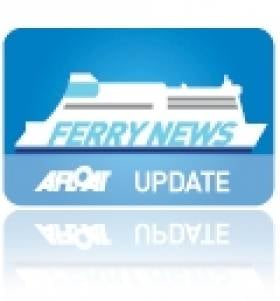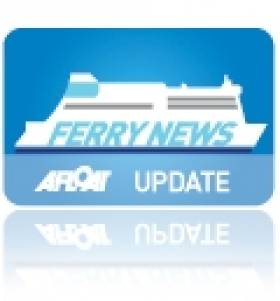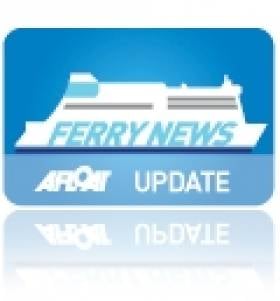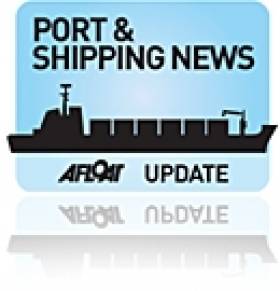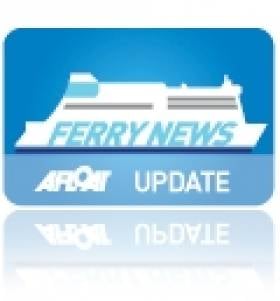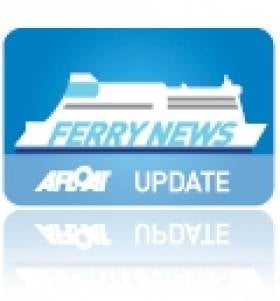Displaying items by tag: ICG
#FerrySell - Irish Continental Group (ICG) parent company of Irish Ferries, revealed today it has agreed to sell the €45 million sale of a passenger ferry to a New Zealand company, KiwiRail, as the Irish group reported that its revenues for the first four months for the year grew 4 per cent.
As the Irish Times reports the ferry, Kaitaki built in 1995 and previously operated under names including the Isle of Innisfree and Pride of Cherbourg, has been on charter outside ICG since 2002, most recently to KiwiRail.
The disclosure came in a trading update issued by ICG ahead of its annual general meeting in Dublin. “We consider €45 million for this 21-year-old vessel to be an attractive price,” said analysts at Investec in Dublin in a note to clients, adding that it will leave the group with net cash on the balance sheet.
ICG’s latest trading statement said that consolidated group revenue for the first four months of the year came to €95.1 million, up 4 per cent on the year, while net debt fell to €24.5 million from €37.9 million at the end of 2016.
For the year to May 13th, ICG’s Irish Ferries carried 103,200 cars, a decrease of 0.7 per cent on the same period last year, while roll-on, roll-off (RoRo) freight volumes fell by 1.7 per cent.
For more on the story, click here.
#ICGnewbuild - Senior management of Irish Continental Group (ICG),parent company of Irish Ferries, visited the German shipyard of Flensburger Schiffbau-Gesselschaft & Co.KG that is to build a new €144m cruiseferry.
It is almost a year to when ICG announced the contract for the 50,000 gross tonnage cruiseferry to the FSG yard.
Eamonn Rothwell, Chief Executive of ICG accompanied by Andrew Sheen, Managing Director of Irish Ferries on Friday visited the FSG yard in Flensburg to oversee the cutting of the first steel plate for use in the construction of their cruise ferry. The newbuild is scheduled for delivery in mid 2018.
Commenting at the ceremony Mr Rothwell said "This first steel cutting is more than symbolic and starts the practical construction of our new build. This investment underpins the confidence the Group has in both the freight and passenger tourism markets between Ireland, Britain and France”.
When in service, the cruiseferry will accommodate 1,885 passengers and crew, with 435 cabins and with capacity for 2,800 lane metres of freight (165 freight vehicles). An additional dedicated car deck with also provide capacity for 300 passenger cars.
Irish Continental Group Statement of Results for 2014
#ICGresults2014 – Irish Continental Group released today a full year Statement of results for the year ended 31 December 2014.
As outlined below are the Groups' key financial and performance highlights for last year:
• Revenue up 9.6%, adjusted EPS up 12.3%
• Dividend increased by 5%, Net Debt down 34.4%
• RORO freight volumes +20.8%, car carryings +8.8%
Commenting on the results Chairman John B McGuckian said, "2014 was another successful year for the group with growth in revenue of almost 10% to €290.1 million and earnings before non-trading items, interest, tax, depreciation and amortisation (EBITDA) of €50.5 million, up 2.6%, having absorbed the costs of the newly introduced vessel, 'Epsilon'.
"The strong momentum, evident in Q4 of 2014 has continued into early 2015 giving us confidence that we can look forward in 2015, in the absence of unforeseen developments and assuming continued lower oil prices, to strong growth in revenue and earnings."
2014 proved to be another successful year for the Group, with a positive financial and operational performance, and a strengthening of the Group's strategic positioning as the leading maritime transport provider in the Republic of Ireland.
Revenue for the year grew 9.6% to €290.1 million with growth of 14.0% in the Ferries Division and 2.6% in the Container & Terminal Division. Operating costs (excluding depreciation) were 11.2% higher at €239.6 million as we absorbed the full year incremental cost of the additional vessel, 'Epsilon', introduced in late 2013.
EBITDA increased by 2.6%, to €50.5 million. Operating profit (before non-trading items) was up 9.0% at €32.7 million. The net finance charge was €4.7 million (2013: €6.3 million). The taxation charge was €0.7 million compared with €0.4 million in 2013. There was a non-trading item of €28.7 million resulting from the curtailment gain recognised as a result of the pension deficit funding agreement concluded during the year.
Basic EPS (including non-trading items) was 30.4 cent (2013: 14.6 cent), while adjusted EPS (excluding non-trading items and the net interest cost on defined benefit pension schemes) was 12.3% higher at 15.5 cent.
For further breakdown analysis of the various divisions of ICG, click HERE.
ICG Release Mid-Year Financial Results
#ICGresults – Irish Continental Group (ICG) parent company of Irish Ferries, have released financial report results for the half-year ended 30 June 2014.
Results
The Board of Irish Continental Group plc (ICG) reports that, in the seasonally less profitable first half of the year, the Group recorded revenue of €130.7 million compared with €120.9 million in the same period in 2013, an increase of 8.1%.
Earnings before interest, tax, depreciation and amortisation (EBITDA) were €14.0 million compared with €15.8 million in the same period in 2013.
On a like-for-like basis i.e. excluding the newly introduced vessel 'Epsilon', EBITDA was up €1.2 million on the prior year.
Operating profit was €5.2 million compared with €6.4 million in 2013. Group fuel costs were up €2.5 million (10.5%) to €26.4 million, however when 'Epsilon' (€3.6 million) is excluded, fuel costs decreased by €1.1 million (4.6%) to €22.8 million.
There was a net finance charge of €2.5 million (2013: €3.1 million) which includes a net pension interest cost of €0.7 million (2013: €1.0 million) and net bank interest payable of €1.8 million (2013: €2.1 million).
Profit before tax was €2.7 million compared with €3.3 million in the first half of 2013. The tax charge amounted to €0.3 million (2013: €0.3 million).
Basic EPS was 1.3c compared with 1.6c* in the first half of 2013.
Adjusted EPS (before non-trading items and net pension interest cost) amounted to 1.7c (2013: 2.2c*).* As restated for the 10-for-1 share split (refer to note 2).
Commenting on the results, ICG Chairman John B. McGuckian stated; ''The introduction of the new RoRo ship 'Epsilon' on the Dublin-Holyhead and Dublin-Cherbourg routes has allowed us to grow both our freight and tourism businesses substantially during the year to date".
"I am particularly pleased with the growth in our RoRo freight business, up 20% in volume terms year to date (23 August 2014) while car volumes also remain strong - up 8% year to date (23 August 2014). The increases in both flows of business vindicate our decision to incur the necessary start-up costs in providing this much needed capacity.''
Epsilon: Strong revenue growth, up 8.1%, facilitated by the introduction of the new ro-ro vessel.
- 'Epsilon' drives volume growth in RoRo freight, up 18.5%
- Cars carried up 5.9% in the period
- Net Debt down to €71.9 million from €93.4 million at 31 December 2013
- Interim dividend 3.465 cent, up 5%
- Strong volume growth in summer, in both RoRo freight (up 25%) and cars (up 12%)
- Agreement reached with Pension Trustee on recovery plan
For further information showing all details of ICG's half-yearly financial report, click HERE.
Rising Costs Scuttle ICG's Ferry Profits
#FERRY NEWS – The Irish Continental Group (ICG) operators of ferry division Irish Ferries, said today its pre-tax profit for last year fell by 30 per cent to €28.2 million on the back of higher fuel costs, reports The Irish Times.
Despite the tough trading conditions, the group said it revenue for 2011 rose by 4.2 per cent to €273.3 million. Irish Ferries saw its passenger numbers for the year fall marginally by 0.7 per cent to 1,527 million, while its roll-on roll-off freight rose up by 9 per cent.
The company said the extremely challenging economic circumstances in the Republic contributed to the lack of growth in the market, and the pressure on operating costs for our freight customers remained intense.
Chairman John B McGuckian predicted the current year would remain challenging as fuel costs have further increased but with the group's "disciplined approach to capacity" he said he was confident of its prospects.
In the year to date, the ferry operator has carried 31,100 cars, down 8.5 per cent on 2011 and 138,600 passengers, up 0.8 per cent on 2011.
The reduction in car carryings partially reflects an 11 per cent reduction in sailings in the year to date but also a quieter than expected start to the year, it said.
Former B+I Line Freight-Ferry Bound for Turkish Breakers
#FERRY NEWS-P&O Irish Sea's Larne-Troon freight-ferry Norcape (14,087grt) departed the Co. Antrim port last week to be broken-up at ship-breakers in Aliaga, Turkey. She originally served B+I Line as the Tipperary, but her last sailings took place on the North Channel in late November, as the ageing vessel is in her fourth decade of service, writes Jehan Ashmore.
The 125-trailer capacity ro-ro was not replaced on the single-ship operated route which closed for the winter months, though sailings will resume next March by the 92m fast-ferry Express. In the meantime freight traffic will be accommodated on the companies Larne-Cairnryan service.
Yesterday morning Norcape transitted the Strait of Gibraltar having called en-route to Falmouth several days previously. She represented the last vessel to serve in Irish waters with a direct link to B+I Line, the state-owned operator which was sold in 1992 to ICG, parent company of Irish Ferries.
When she arrives in Aliagra, this is where her former P&O fleetmate European Mariner (5,897grt) was scrapped after also serving Larne-Troon sailings until last July. Norcape entered the North Channel route replacing the smaller 53-trailer capacity vessel.
Prior to then Norcape had been in laid-over in Liverpool docks when European Endeavour replaced her in February on the Dublin-Liverpool route. To read more click HERE.
Norcape's return to the Irish Sea service in 2009, reflected her original career for P&O. She was named Puma in 1979 from the Japanese shipyard at the Mitsui Engineering & SB Co Ltd, Tamano, however she was chartered to B+I Line and renamed Tipperary. To read more and to view a deck-drawing profile, click HERE.
Her career started with a new Dublin-Fleetwood route jointly operated with P&O, who contributed with a sister, the Ibex. The P&O brand name Pandoro stood for P and O Ro, their roll-on roll-off freight division. The route's UK port switched to Liverpool in 1988 with Tipperary remaining on the route until sold to North Sea Ferries in 1989 and renamed Norcape.
Before her transfer to the North Sea, Tipperary collided with the 4,674grt bulker Sumburgh Head off the entrance to Dublin Port in 1988. Incidentally the two vessels, under different names and ownership were in Dublin Port in 2010, as previously reported (with photo) click HERE.
- Ports and Shipping News
- Norcape
- P&O (Irish Sea)
- B+I Line
- European Endeavour
- Ferry news
- Irish Sea Ferries
- Irish Sea ferry news
- LarneTroon
- MV Tipperary
- Turkish shipbreakers
- P&O Express
- MV Ibex
- Pandoro
- Aliagra,Turkey
- MV Norcape
- ICG
- ICG Group
- Irish Continental Line
- North Channel ferry routes
- LarneCairnryan
- Irish Ferries
Irish Ferries Win Best Ferry Company
#FERRY NEWS- Irish Ferries has won the 'Best Ferry Company' award at the Irish Travel Agents Association travel industry awards held last night in the Mansion House, Dublin.
This was the thirteenth time that the award has gone to Irish Ferries since the event started two decades ago. The award which was presented on foot of votes cast by travel agents and their staff employed throughout the island of Ireland was accepted jointly by its head of passenger sales Declan Mescall and passenger sales manager Marie McCarthy.
Thanking travel agents for the honour their decision bestows on the company, Mr. Mescall said that the Best Ferry award reflects the high standard of service which passengers can now expect from Irish Ferries.
'In addition, it recognises the numerous developments that have taken place in the company in recent times, including the introduction of class leading advances in electronic communications, the most recent being the introduction of the industry's first bookable smart phone app which was launched just months ago' said Mr. Mescall.
The award follows Irish Ferries parent company Irish Continental Group (ICG) whose Dutch based container division Eucon Shipping and Transport was awarded Short Sea Shipping Company of the Year Award 2011, sponsored by the Irish Maritime Development Office (IMDO).
Eucon operate regular feeder services to Antwerp, Rotterdam and Southampton from the ports of Belfast, Dublin and Cork.
Export Industry Awards to Deep and Short Sea Shipping
Eucon Shipping and Transport Ltd won the Short Sea Shipping Company of the Year Award 2011, sponsored by the Irish Maritime Development Office (IMDO), which recognises the strategically important role of short sea shipping to our economy. Eucon offers Irish exporters access to worldwide markets via its regular feeder services to Rotterdam, Antwerp and Southampton operating from the ports of Dublin, Cork and Belfast. The other nominees were: CLdN RoRo S.A. and Grimaldi Lines.
In the category for the Logistics Company of the Year Award 2011, sponsored by Dublin Port Company, the award went to Caffrey International. The Co. Meath based company is a specialist provider of road transport and logistics services between Ireland, the UK and continental Europe.
The award recognises the importance of logistics and supply chain management firms to the exporting effort of companies trading internationally from Ireland. The other nominees were: DHL Global Forwarding (Ireland) Ltd., Dublin; Eucon Shipping and Transport Ltd. and Geodis Ireland Limited, Dublin.
ABC Nutrition of Shannon was presented with the overall award of the Exporter of the Year Award 2011 after winning in the Emerging Markets Exporter Award, one of twelve categories which were presented at the ceremony.
Brittany Ferries Re-Open Bilbao Route
The Cap Finistere has a 790 passenger / 500 vehicle capacity and the vessel will operate two round trips weekly with each crossing taking 24 hours. Interestingly an additional en-route call to Roscoff is scheduled on Sunday sailings bound for Bilbao which will take 33-hours. This is to facilitate a crew change, as the Cap Finistere does not operate on any of the company routes from France.
In 2009 the P&O service carried 180,000 passengers and 193,000 in 2008 but closed due to "unsustainable losses". There were 800 redundancies but some 150 staff jobs were secured through transfer. Click here for a previous posting. The company were in direct competition with Brittany Ferries existing two routes between Plymouth and Poole to Santander.
The Bilbao route brings the Brittany Ferries operations to five sailings weekly between the UK to Spain, two from Portsmouth to Santander and a single round-trip to Plymouth.
The Pride of Bilbao was sold late last year by ICG to the Baltic Sea based St. Peter Line at a profit of €9.4m. The vessel underwent refurbishment and was renamed Princess Anastasia and next month starts a new St. Petersburg-Stockholm service, with Russian bound sailings calling en route to
the Estonian capital of Tallinn. Click here for more details.
Pride of Bilbao's return to the Baltic is nearly full-circle as the 2,553 passenger / 600 vehicles vessel, built in 1986 as Olympia for Viking Line's also operated out of Stockholm to Helsinki, and at the time was one of the largest overnight passenger capacity ferries in the world.
Irish Ferries Signs 10-Year Contract On Welsh Route
The St. Georges channel crossing carries over 300,000 passengers and 80,000 freight annually and is served by the 34,031grt Isle of Inishmore. The ro-pax can handle 2,200 passengers, 802 cars / 152 freight trailers and is scheduled to two daily round trips, on a route that take nearly five hours.
The 1997 Dutch built vessel was first launched onto the central corridor route between Dublin-Holyhead but was transferred to the southern service after the introduction of Ulysses in 2001.
Rosslare-Pembroke Dock sailings only began in 1980, firstly operated by the B+I Line which competed with rival operators Sealink / British Rail (now Stena Line) on services running out of Fishguard.
This route was well established having started operations in 1906 and in an era when the railway companies (in this case the Great Western Railway) developed and owned the ports plus the operation of shipping services on the Irish Sea.


























